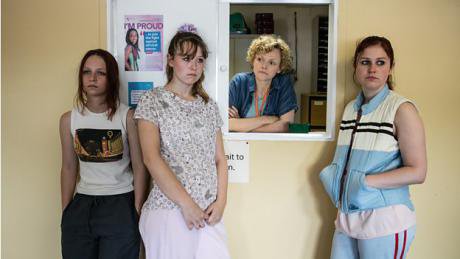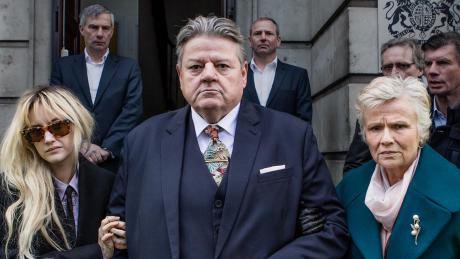
The BBC's Three Girls drama. Photo: BBC online.
“Gut-wrenching,” “brave” and “unflinching” are some of the adjectives flying around in the conversations on social media after the airing of Three Girls, BBC drama at its best. Based on the real-life stories of the grooming of young white girls by Asian men in Rochdale, England, this three-part drama had all the potential for reigniting the bitter, racist debates that take place each time news breaks of yet another grooming gang across England. Aware of the sensitivity of the issues, the drama seeks to head off allegations of racial bias with this disclaimer at the beginning of each episode: “What follows is based on extensive research, interviews and published accounts.” At the end of the drama, the names of 36 towns and cities where paedophile gangs have been busted come up on screen in a chilling sequence.
Two of the three girls at the heart of the series are sisters, Ruby and Amber (not their real names), who are living with their cousins and other under-aged young people in a house where parties and alcohol seem to be the order of the day. Into this chaos, arrives Holly (15) who relishes the freedom that she cannot enjoy at home. The girls hang out at Top Curry, a takeaway where they are plied with alcohol, drugs and food by an older Asian man grotesquely nicknamed ‘Daddy,’ and where Amber hooks up with her ‘boyfriend’ Tariq.
...incompetence, misogyny, class prejudice and a misplaced racial sensitivity.
Gradually the girls are ensnared into having sex with these men and then ferried around, effectively trafficked, to other towns in Tariq’s taxi to be “passed around like a ball” amongst a group of men as Ruby, the youngest at 13 and with learning difficulties, describes it. Amber is used by Tariq through a mixture of terror and financial incentives to find other girls and to make sure that Holly and Ruby don’t leave. Although nine men are finally arrested and convicted, there is a shocking trail of incompetence, misogyny, class prejudice and a misplaced racial sensitivity which leads to the girls being treated shabbily, police investigations being dropped and the men left free to continue their abuse.
The drama was careful to address some of the race, class and gender tropes that have coloured the national debate. Victim blaming is frequent in situations of male violence; in Rochdale it comes from the police who described the girls as coming from “chaotic, council estate backgrounds” (a euphemism for ‘white trash’). The drama’s writer, Nicole Taylor, is careful to counter this narrative by choosing Holly as her protagonist – she is from a middle-class family forced to move to a council home after her father’s business fails. “Chaotic lives” better describes Ruby and Amber whose parents are nowhere to be seen until episode two, when their mother suddenly appears to pick Ruby up from the police station.
The drama also rubbishes the trope that these girls were making “lifestyle choices” as the social worker alleges. Sara Rowbotham, a sexual health worker and the only member of the establishment these girls trusted, argues compellingly that “there is no such thing as a child prostitute, what there is – is a child that is being abused” in trying to get complacent social workers and police to take action. The widely-held view, encouraged by the police officers themselves, that the police were reluctant to take action for fearing of stoking racial tensions just doesn’t hold amid ongoing “stop and search” tactics which target black men, lead to very few arrests and even fewer convictions, and do cause racial tension. My view is that the race argument was a cover for a deep-seated misogyny that these girls were ‘slags’ therefore no police action was required.
...the privatisation of care homes is the hidden economic dimension of this sorry saga.
Of the five girls who testified in court in the real-life case in 2012 was one who was living in a care home. Although her story was not highlighted in the drama, the privatisation of care homes is the hidden economic dimension of this sorry saga. The British journalist Daniel Trilling has written about how profit margins drive the profusion of care homes in particular areas like Rochdale where property prices and wages are low. Care homes have long been recruiting grounds for vulnerable young girls by abusive men. There are 47 privatised care homes in Rochdale as compared to two in Haringey, North London, ensuring a near endless supply of girls in one of the most deprived boroughs in England.
Among Asian communities in northern towns, high unemployment and low educational achievements create an environment where drug dealing, pimping and taxi-driving are the only profitable occupations left. Combine this with an attitude among some Asian men that white girls are easy and we have an explosive mix. The same situation existed in Bradford where I researched the issue extensively while writing a play about a woman supported by Southall Black Sisters (SBS) who killed her pimp and abuser. In the 28 years that I have been a member of SBS we have come across this particular matrix repeatedly.
In Three Girls, Shabir Ahmed, one of the gang, says as much in court when he blames white people who train young girls “in sex, in drinking before they come to us.” This of course doesn’t mean that Asian girls and women are not abused by such men too. They are – but the methods used are different. The Muslim Women’s Network catalogued the abuse of Asian girls in a report, Unheard Voices. The racial dimension of this issue is so multi-layered that to represent it as Asian men targeting white girls, as the right wing media have done generally, is reductive and distorting.
One columnist referred to race in the context of grooming as the “elephant in the room.” But this is disingenuous: the press has churned out numerous stories on this with screaming headlines like The faces of evil. It has become common for those focusing on race to present themselves as brave for having dared to do so. This is insulting, too.
Three Girls does not and, in any case, cannot dodge the ethnic origins of the men. But it avoids the racist trope that all or most Muslim men are unreformed paedophiles by giving dramatic prominence to Nazir Afzal, Chief Crown Prosecutor for the CPS (Crown Prosecution Service), of Muslim origin, who is determined and principled in his pursuit of these men. Unlike his white predecessors, Afzal argues that Holly is a credible witness, believes that the CPS were wrong not to pursue the case when Holly first gave her statement, on the basis that the jury would not find her testimony credible. He acknowledges publicly the CPS’s failure.
...tarring an entire community because of the acts of a few is mindlessly racist.
By dramatising a community meeting addressed by Afzal after the convictions, the writer is able to articulate the anger of the Muslim community at the racism that has been unleashed against them as a result. When Afzal says that 90 percent of child grooming for sexual abuse is carried out by white British males acting on their own, it places the Muslim gangs in perspective and addresses the concerns of those who felt that the debate was lopsided. The inclusion of a short scene on the steps of the court when Afzal arrives for the trial and is racially abused by a BNP demonstrator who mistakenly takes him for one of the grooming gang makes the point succinctly – that tarring an entire community because of the acts of a few is mindlessly racist.
What the series could have done is show us the impact of these men’s actions on their families and their community – there are women and children on that side of the fence whose lives would have been devastated too. What a contrast to the way in which National Treasure, the recent C4 drama on child sexual abuse which aired in autumn 2016, traced with great sensitivity and ambivalence the fallout from the accusations against a white comedian, Paul Finchley, of the rape of two young girls, a 15-year-old fan and his daughter’s babysitter.

Channel 4's National Treasure. Photo: Channel 4 online.
We do not know until the end of that series whether the allegations are true or not – which also plays on the misogynist trope that women and girls ‘make up’ these allegations without concern for the ramifications. We are invited to share the dismay of his wife and daughter, the crumbling away of his reputation and the drying up of work opportunities. We see his pain, his tears, his brokenness. He gets a chance in court to say sorry to his wife. Finchley is humanised.
The comedian is cleared of the charges thus inviting compassion for the predicament of abusers who have been falsely accused. At the very end, in a final twist and a flashback sequence, we see that he did indeed rape his fan. When the two dramas are taken together as part of a national narrative on race, the imbalance in the portrayals is shockingly clear.
Read more
Get our weekly email
Comments
We encourage anyone to comment, please consult the oD commenting guidelines if you have any questions.